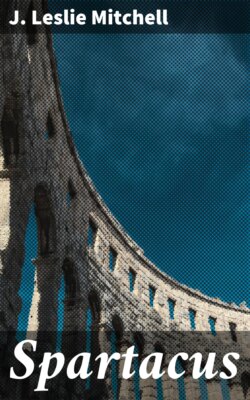Читать книгу Spartacus - J. Leslie Mitchell - Страница 4
На сайте Литреса книга снята с продажи.
(ii)
ОглавлениеTable of Contents
Three mornings after setting out on the road to Capua he awoke on the edge of the dark and found two men bending over him. One held a pliant cord in his hands, and stooped with drooling lips. The young sunlight dappled Kleon’s face and he smelt the dew-wet vines. He laughed and stretched himself and bared his throat.
‘I am ready,’ he said.
They drew back, startled, threatening. Thereon Kleon suddenly leapt to his feet and struck at the nearest with his dagger. The man swore and jumped aside. Kleon laughed again. The roll of The Republic fell from his breast.
‘Slit throats are to the swift, you swine.’
Then he stood and considered them. They were shepherds, clad in grey felt tunics, with bare feet and legs and conical hats. One was tall, red-haired, an obvious Gaul, with sleepy eyes and curling lips. The other was of lesser stature and different breed, and he it was held the rope. His forehead and chin sloped steeply away from the line of his straight, keen nose. And, looking in his eyes, Kleon was aware that they were the eyes of one aberrant to the point of madness.
‘Why the stranglers’ rope?’ the literatus asked.
‘Why not?’ said the sleepy-eyed shepherd, looking at his companion. The short man bared his teeth.
‘It’s fit end for a Roman slave.’
‘Aren’t you also slaves?’
‘We were—yesterday.’
‘Then you’ve heard of Capua?’
At that the eyes of the sleepy Gaul lit up. ‘We are making Capua,’ he said; and added, with simplicity. ‘So we were to strangle you, to prove ourselves freemen and worthy to kill.’
Kleon picked up his copy of The Republic. ‘I also was a slave. I am going to Capua. Come with me. We’ll be crucified near one another.’
They scowled at him and stood fast. The short man’s lips parted again, shewing decayed teeth.
‘You’re mad, a fool, or an ill augur. Pity you woke so soon. I was to open your chest and offer your heart to Kokolkh—though Brennus, being but a Gaul, was against that.’
‘A sacrifice?’ Kleon was coldly amused. ‘I hadn’t heard of your God. Tell me of him as we go. This is a poor place to hide, and we must make the hills.’ He added, as an afterthought, coldly, ‘I carry a charm that twists in agony the entrails of any who seek my life.’
High up on a hill-ridge they found a grassy dip and squatted there throughout the hours of the day. Below them the country lay blue in the Springtime warmth. To the north a ribbon of river glinted. Once a kid strayed near them and the short man leapt out upon it, strangled it with his hands, and brought it back to their hiding-place. They drank its blood, but their throats were too parched to swallow the raw flesh. The short man speared the kid’s heart on a flake of stone and held it towards the sun, ceremonially. Brennus grinned. Kleon squatted cross-wise and regarded the proceeding with passionless gaze.
‘Who is Kokolkh?’ he asked.
‘I come from the northern seacoast of Iberia,’ the short man said, ‘but I am no Iberian. My name is Titul and my people are the last of a race that lived on the world’s edge, far in the Western Sea. This people was a great people: but they neglected to sacrifice to the God Kokolkh. So he whelmed their country in mud and sand; and the seas rose against it and devoured it.’ He paused ceremonially, being mad, and chanting an oft-told tale. ‘But my fathers fled in boats and them Kokolkh allowed to escape. They saw him, the God visible, in the lightning fires that smote the islands. He was bearded with serpents and on his head were the feather-plumes of the sun.’
Kleon nodded, as the slurred chant ended. ‘It was the island of Atlantis, for so Plato tells. Of him you’ve never heard. And why worship this ill God?’
‘He is Pain and Life,’ said Titul, and ate the heart ceremonially, watched by Brennus the agnostic and Kleon the atheist. The sun wheeled westward. Brennus clasped his hands round his knees, and sang a song in the broken Latin of the vulgares slaves:
‘These are the things I desire:
The city of stakes
And the darkened rooms
Of my home,
And the curling smoke,
And the moon;
Wild cattle low in the woods:
Shall I not return?’
‘He’s a poet,’ said Titul; and fell to his drone. ‘Mighty were the poets of old in the vanished Western Isle.’
Brennus yawned. ‘They were fools. For they were drowned. Let’s sleep.’ He yawned again, and shaded his eyes and looked south. ‘There’s a big farm across that stream.’
Kleon nodded. ‘We’ll try to get near at dusk, and free the slaves. If we form a large enough company, we can march openly to join the Games men.’
Titul licked his thick lips and also peered through the haze. ‘There may be women there—women of the Masters.’
Stretched full-length on the sun-warmed grass, Brennus purred drowsily. ‘No women are like the Gaul women. Oh, Gods, Gods, none at all! And I haven’t had one since they brought me south four years ago this Spring. Deep-breasted and with wide full hips; and we used to raid them. Gods! for a strong, warm woman to weep under your hands!’
‘In the Western Isle,’ said Titul, ‘there were mighty women.’
